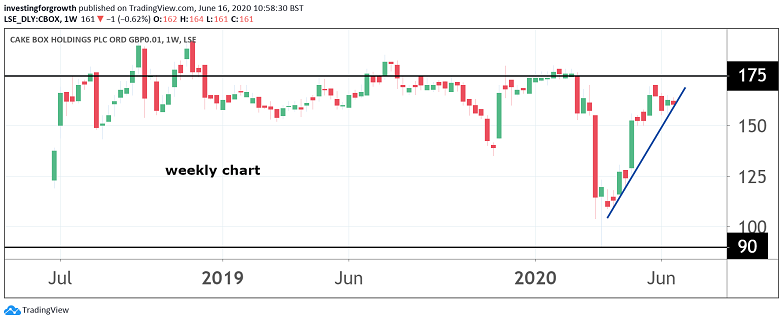Stockwatch: a share benefiting from comfort food revival
A strong recovery from the March low means our companies analyst remains confident in this AIM share.
16th June 2020 11:09
by Edmond Jackson from interactive investor
Share on
A strong recovery from the March low means our companies analyst remains confident in this AIM share.

Notably, £65 million AIM-listed producer and franchised retailer of cream cakes Cake Box (LSE:CBOX) has recovered all its share price fall from March/April, back to about 160p, despite its 133 stores being closed for six weeks and a latest CEO outlook statement cautioning how “Covid-19 has inevitably impacted performance of our new financial year and will continue to.”
So does small-cap enthusiasm for Cake Box exemplify fevered market sentiment, or is confidence justified in a business poised to benefit as people long for some pep up?
Mixed messages lately - fundamental and technical
After floating on the London Stock Exchange two years ago Cake Box’s stock traded in a circa 150p to 170p range (occasionally up to 190p) as investors recognised potential for the company’s egg-free cake to gain popularity among Hindus, and also meet demand for celebration cream cakes with personalised messages.
The results table below shows respectable progress, although latest result for the year to 31 March 2020 reveal a broad-based rise in administrative costs, compromising the operating margin from around 26% to 20% - still a good outcome.
In chart terms, the stock has been an unexciting near flat-line that would have failed to attract technical buyers.
The Covid-19 sell-off then meant a plunge to 100p, but Cake Box re-gained all of this during April and May, despite a 24 March update citing all stores to be shut until government advice changes.
Effectively that’s a break-out though, if you assume impaired fundamentals by way of six weeks’ business lost from shuttering, the final dividend passed, and the CEO hedging his outlook somewhat – both in terms of the virus’s effect on operations, and potentially delaying new franchised stores.

Source: TradingView. Past performance is not a guide to future performance.
75% of franchised stores now trade at pre-Covid-19 levels
The business looks promising for revenue, however. Higher sales on last year during the first week of June will reflect opening 20 more in the last financial year, taking the total to 133 at end-March.
About 75% of them are now trading at pre-Covid 19 levels since an 11 May update cited re-opening 79 stores with social distancing and staff wearing PPE.
Moreover, online sales are up about 60% on the first few weeks of the last financial year, the lockdown apparently triggering home deliveries via Uber Eats and Just Eat (LSE:JET) in May, and now Deliveroo.
Click-and-collect is also offered via 12 kiosk stores having opened in shopping centres.
Sales recovery has been achieved despite production of cake ingredients recently limited to one site of two (with a third becoming operational this year).
It suggests demand is perky and Cake Box’s marketing is getting through versus supermarkets, unless benefiting from reduced choice available there lately. New products such as salted caramel and red velvet cakes have been introduced.
Various bespoke bakeries do pitch online, but how many people will pay up to £45 for a decent-size cake?
Despite lockdown having compromised scope for parties, a culture of indulgence appears underway – potentially securing more repeat customers.
While 2019/20 earnings per share of 7.8p falls short of 9.5p projected, with 11p for 2020/21 looking as if due a trim, extra demand could offset recently lost sales to make 9.5p more realistic as a 2020/21 scenario.
This implies a forward price/earnings (PE) ration of around 17x with the stock currently at 161p.
This explains why the share price barely moved on the results but, unless easing of social restrictions fails to contain Covid-19, higher PE’s look likely to stick.
Monetary policy has made investors’ search for asset returns increasingly desperate; hence, in a relatively tight small-caps market, it may need a sudden overhang to bring prices back lower.
| Cake Box Holdings - financial summary | |||||
|---|---|---|---|---|---|
| year end 31 Mar | 2016 | 2017 | 2018 | 2019 | 2020 |
| Turnover (£ million) | 5.6 | 8.7 | 12.8 | 16.9 | 18.7 |
| Operating profit (£m) | 1.2 | 2 | 3.4 | 4.4 | 3.8 |
| Operating margin (%) | 21.7 | 22.9 | 26.3 | 26.3 | 20.3 |
| Net profit (£m) | 1.1 | 1.6 | 2.8 | 3.0 | 3.2 |
| Reported earnings/share (p) | 2.7 | 4.1 | 6.9 | 7.5 | 7.8 |
| Normalised earnings/share (p) | 2.7 | 4.1 | 6.9 | 8.7 | 7.8 |
| Operating cashflow/share (p) | 5.4 | 1.5 | 8.0 | 7.9 | 8.4 |
| Capital expenditure/share (p) | 1.4 | 1.0 | 1.3 | 5.3 | 1.4 |
| Free cashflow/share (p) | 4.0 | 0.5 | 6.7 | 2.5 | 7.0 |
| Dividend per share (p) | 3.6 | 1.6 | |||
| Covered by earnings (x) | 2.1 | 4.9 | |||
| Cash (£m) | 0.2 | 0.5 | 2.5 | 3.1 | 3.7 |
| Net debt (£m) | 1.5 | 2 | -0.9 | -0.9 | -2.4 |
| Net assets (£m) | 0.4 | 2.4 | 4.7 | 6.6 | 9.5 |
| Net assets per share (p) | 1.0 | 6.0 | 11.7 | 16.6 | 23.7 |
| Source: historic Company REFS and company accounts |
Results analysis: mixed, albeit strong cash flow performance
Annual revenue has advanced 11% to £18.7 million and gross profit by 14% to £8.8 million, although a 33% hike in administrative expenses near £5 million shaved pre-tax profit by 1% to £3.8 million.
More positively, the cash balance rose 19% to £3.7 million, helped by net cash from operations up 12% to £4 million, or 10p per share, which, after net investment, was £3.4 million or 8.5p per share.
In valuation terms, Cake Box could be said to deserve credit for its franchise model meaning relatively low fixed costs and good conversion of profit to cash flow; also celebration cakes probably having more enduring appeal than enough franchising concepts that come and go.
Covid-19 dragging on may be an opportunity for a sustainable sales boost, the business set-up can capitalise on.
The hike in admin costs concerns me though; note 4 to the accounts showing them as broadly-based across wages, travel, professional costs, rates/utilities, property maintenance and advertising.
It needs better explaining given all such could see continued inflation as all businesses examine their cost bases and try to plug gaps.
More positively global prices for cream have been in a downtrend the last two years.
A cash generative profile also explains the strong end-March balance sheet with cash up 19% near £3.7 million, and the only debt being a £1.6 million mortgage secured on freehold properties.
There is no capitalised goodwill or intangibles, and trade receivables versus trade payables are in good balance than inviting suspicion whether reported profit benefits from late payments to suppliers.
- 10 stocks that pass four important dividend tests
- Richard Beddard gives this top AIM share the thumbs up
- Take control of your retirement planning with our award-winning, low-cost Self-Invested Personal Pension (SIPP)
Still has a speculative element but looks attractive
I originally drew attention as a ‘speculative buy’ at 163p in September 2018, around the price it shot to when listing at 108p that June. My interest derived from having followed various specialist food manufacturers capitalising on the “free from” trend; public obsession with Bake Off and Britain being the fattest nation in Europe.
Despite occasional rumours about a government campaign against obesity, is this culture really going to change, especially now that Covid-19 is boosting consumption of alcohol, and likely comfort food too.
A year ago, I then re-iterated ‘buy’ at around 170p following the 2018/19 results and the commercial director buying three lots of just over 3,000 shares at prices around 160p for his SIPP, owning 551,012 overall.
This is the kind of long-term salting away of equity you want to see, rather than options granting/trading.
My preferring a ‘speculative’ tag partly reflects wariness about how revenue from a smaller franchiser benefits from such new sales, hence, the equity being good to hold for so long as expansion continues apace.
But active small-cap investors will be prone to sell at the first sign of it slowing. A flotation should be given time to prove its merit, especially after founders cashed in £16.5 million, reducing their stake from 88.4% to 50.1%.
You could say that my having twice rated the stock ‘buy’, with the business now showing promising signs of demand, means I am logically trapped than to temper to a ‘hold’ rating in uncertain times, after a rebound.
Much still obviously depends on how the net effects of Covid-19 pan out, and should the speculative bubble in US stocks burst causing risk appetite to contract here. Yet this business does look to be gaining traction for whatever scenario of lockdown: easing or resuming. Buy.
Edmond Jackson is a freelance contributor and not a direct employee of interactive investor.
These articles are provided for information purposes only. Occasionally, an opinion about whether to buy or sell a specific investment may be provided by third parties. The content is not intended to be a personal recommendation to buy or sell any financial instrument or product, or to adopt any investment strategy as it is not provided based on an assessment of your investing knowledge and experience, your financial situation or your investment objectives. The value of your investments, and the income derived from them, may go down as well as up. You may not get back all the money that you invest. The investments referred to in this article may not be suitable for all investors, and if in doubt, an investor should seek advice from a qualified investment adviser.
Full performance can be found on the company or index summary page on the interactive investor website. Simply click on the company's or index name highlighted in the article.
Disclosure
We use a combination of fundamental and technical analysis in forming our view as to the valuation and prospects of an investment. Where relevant we have set out those particular matters we think are important in the above article, but further detail can be found here.
Please note that our article on this investment should not be considered to be a regular publication.
Details of all recommendations issued by ii during the previous 12-month period can be found here.
ii adheres to a strict code of conduct. Contributors may hold shares or have other interests in companies included in these portfolios, which could create a conflict of interests. Contributors intending to write about any financial instruments in which they have an interest are required to disclose such interest to ii and in the article itself. ii will at all times consider whether such interest impairs the objectivity of the recommendation.
In addition, individuals involved in the production of investment articles are subject to a personal account dealing restriction, which prevents them from placing a transaction in the specified instrument(s) for a period before and for five working days after such publication. This is to avoid personal interests conflicting with the interests of the recipients of those investment articles.